Kurt Rheinheimer
/summer 1981
ST. LOUIS
“Calley wished that her mother were still alive so that they could get dressed up together and get on the train and ride away somewhere. Maybe St. Louis.”
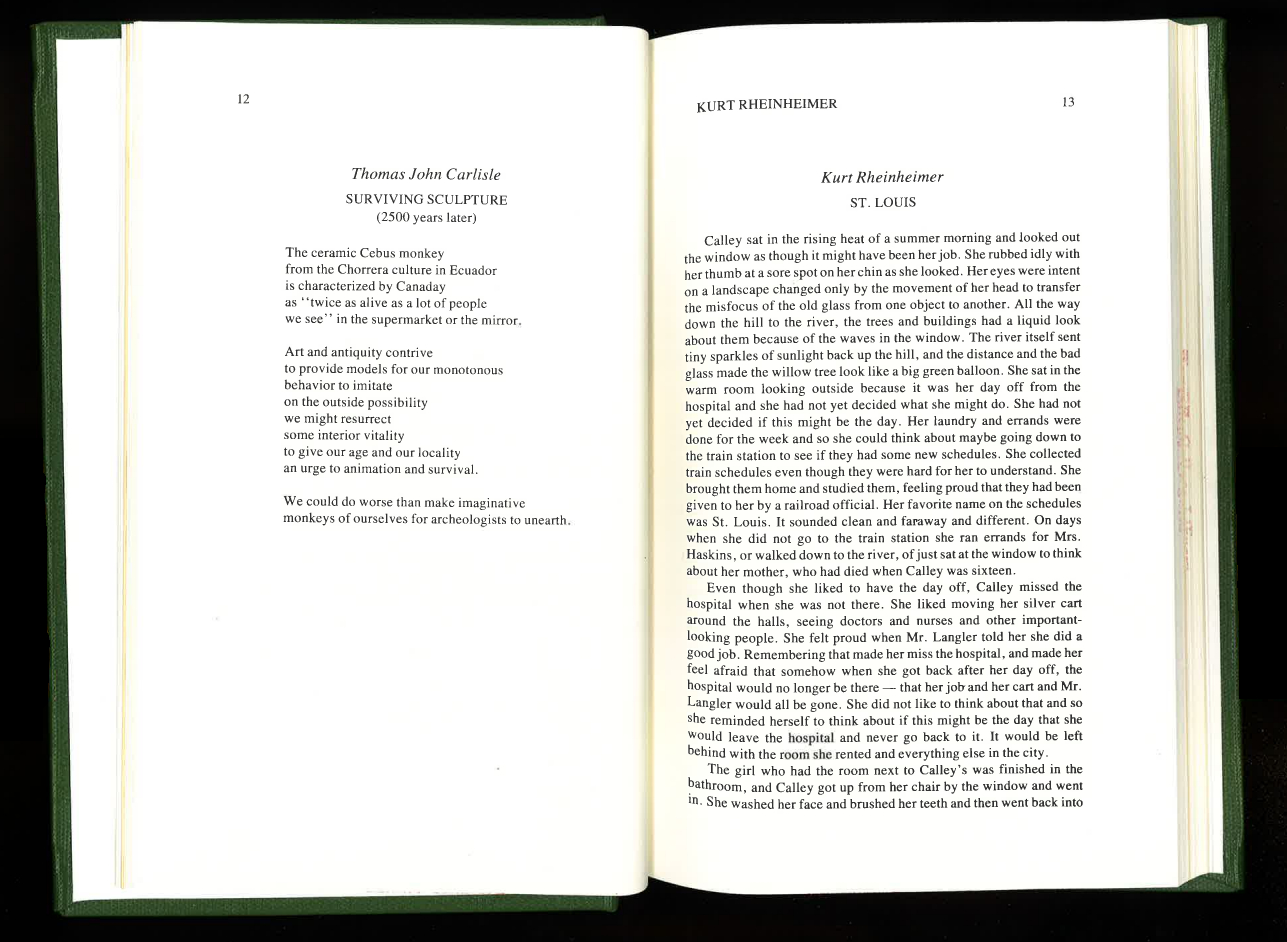
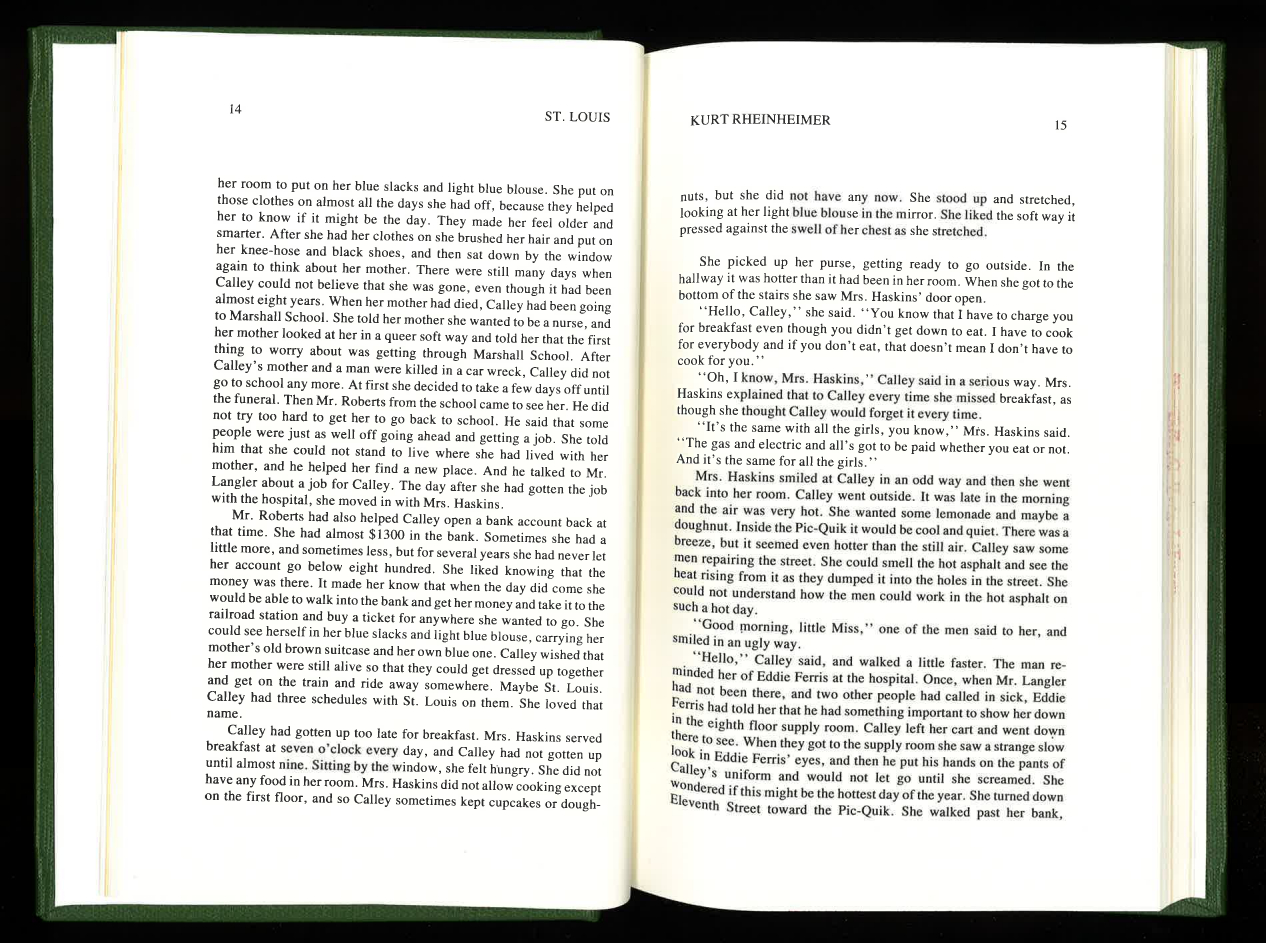
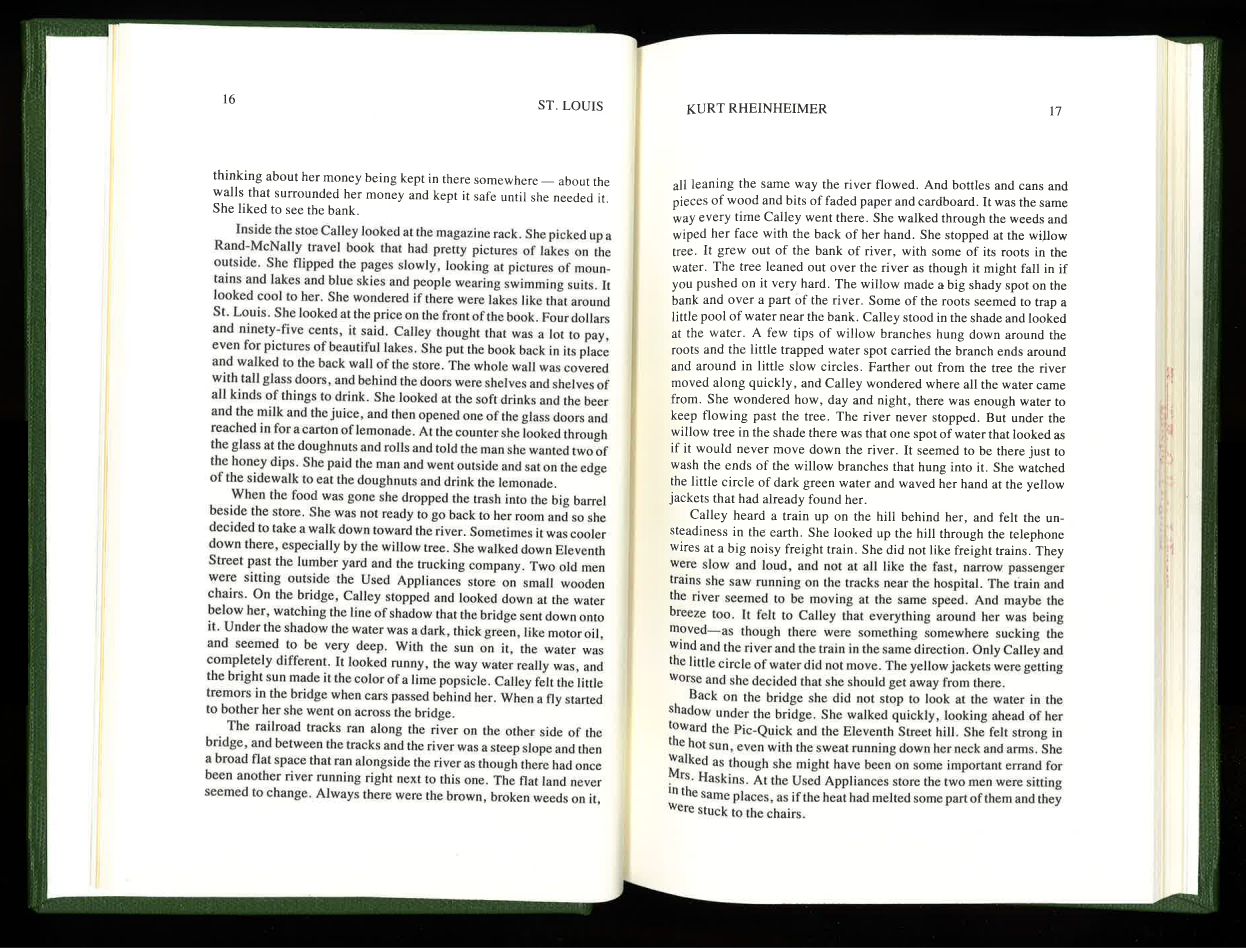
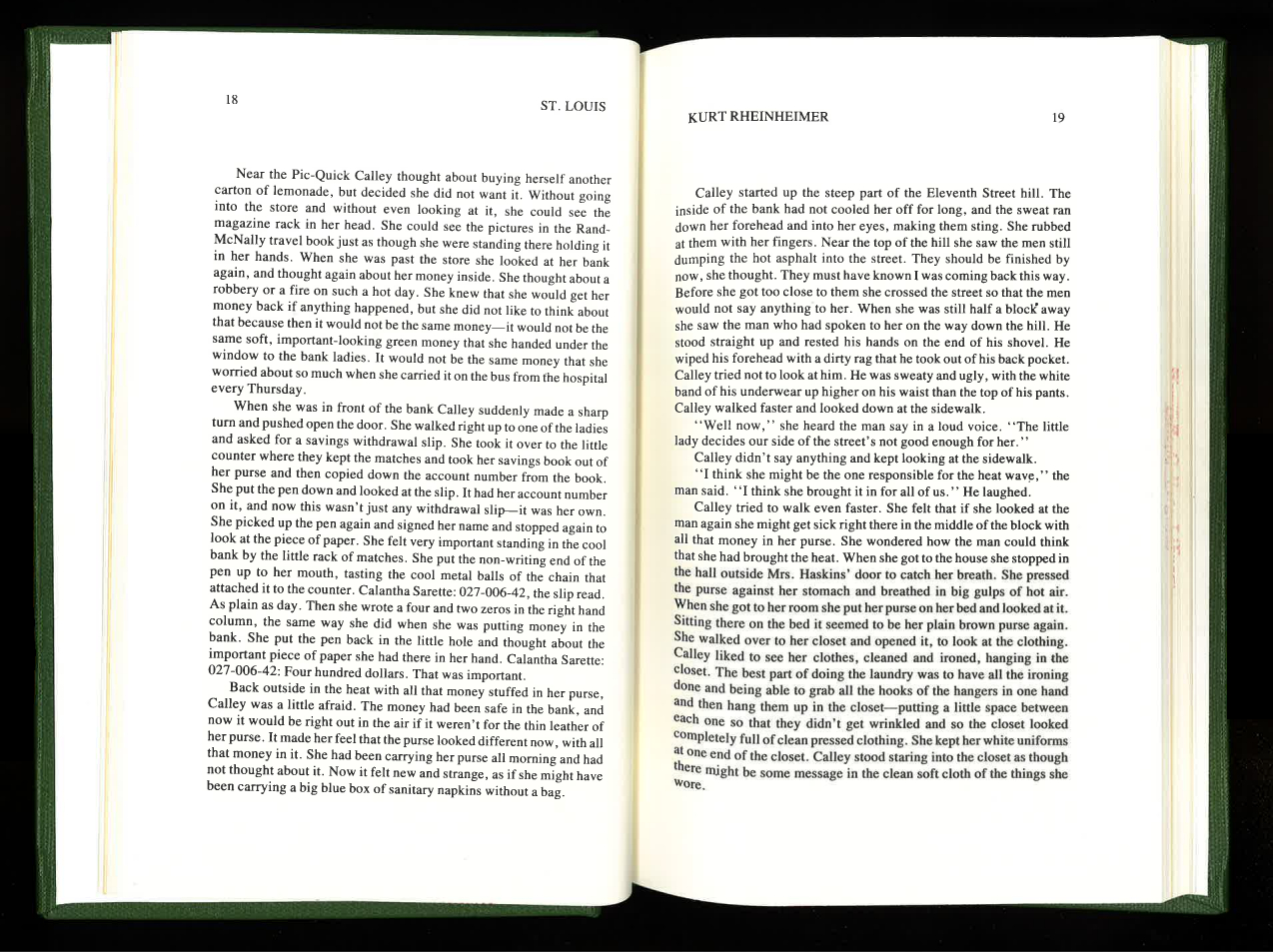
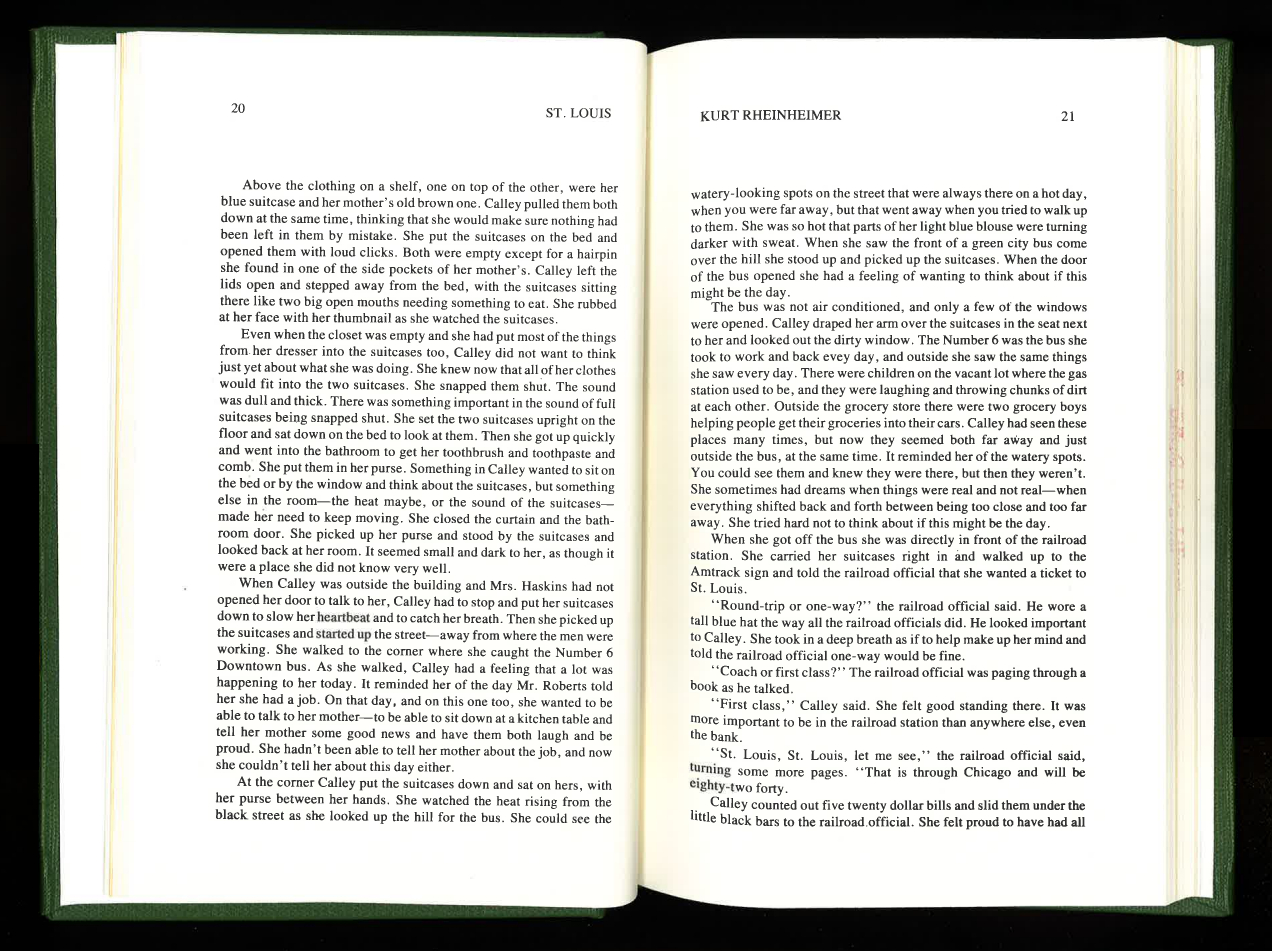
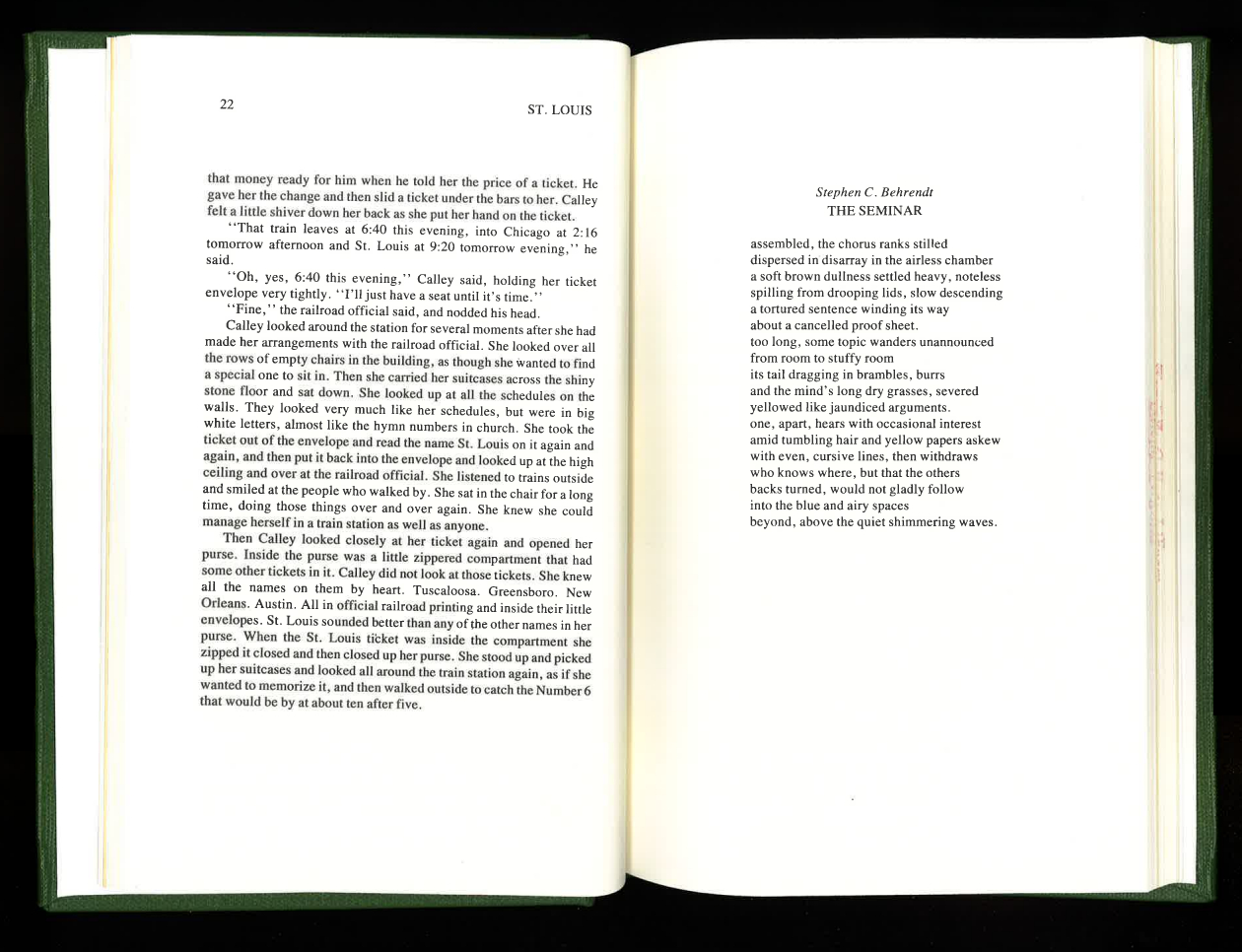
BY KURT RHEINHEIMER - FROM ROANOKE REVIEW, 1981
current work
CALENDAR GIRL ARRESTED, FREED
ROANOKE, VA—Bimini Padgett, 28, was arrested Tuesday morning at 9:20 just inside the silver metal gating protecting the GAP store at the Honeymilk Mall, located at the northeastern edge of the city. The suspect was awakened as she slept on the store floor and offered no resistance as a security guard, under repeated direction from a city police officer, unlocked the gate. There was no immediate explanation why the GAP store was apparently still closed when the mall has a strict 9 a.m. opening time for all its stores.
Honeymilk Mall was built in the early 1980s on 150 acres of a former family farm, by a major East Coast shopping center developer.
Padgett told the detaining officer she’d overslept, and that she had been spending her nights just inside the GAP for “I’d say four to seven weeks now, depending on how you look at it.”
Padgett was not handcuffed. The security guard was heard to mumble something under his breath to her, to which she replied, “It’s cool, it’s all totally cool. I still have plenty of time to get the shop open before there’s any chance the owner gets here.”
The officer was sipping coffee, writing in his little notebook and shifting from foot to foot in plain black shoes. “I mean half the time he doesn’t show up for days on end, except of course to close the register every night,” Padgett shrugged.
“The shop,” it turned out, was a seasonal kiosks set up between two anchors where traffic increases during the holidays. Some kiosks operate all year, some empty out right after Christmas at Honeymilk.
Padgett stretched languorously once she got to the kiosk, revealing a set of navel rings that could possibly show up on radar at the nearby regional airport. Two tiny nose diamonds and a fairly subtle tongue ring seemed innocuous in comparison to the suddenly visible tummy hardware catching the full fluorescence of the mall at about 9:35 a.m.
The officer, still appearing not quite sure what to do, followed Padgett as she reached in under her shirt to reattach her bra in the front, and walked slowly to the main restrooms in the mall, where she disappeared into the ladies’ long enough for him to wonder aloud about calling in a female backup to check on things, and for this reporter to tell him to calm down and let a girl undertake the necessities of the morning the same as the rest of us.
Padgett reappeared in under ten minutes, looking far more presentable than someone who had just slept on the floor of a major, high-markup clothing retailer has any right to look. She had on a different pair of jeans—the same low-rider-cut type she’d had on and that they all wear now—and a loose blue and white scarf around her neck, to set off the lighter blue of her shirt. Her hair looked like she just stepped out of the shower, and she shook it in this little-pony sort of way as she came out the door, looking a little surprised to again see the officer and this reporter. This reporter, by the way, had a girlfriend who used to work at the GAP before she dumped him, so he knows a little about the markup.
“There’s really good discounts right now,” Padgett said, leading the officer back toward the area of the kiosks, one of which is those lotion salespersons that you may have come across, where they walk up to you like muggers and make you feel like you’re parking-lot litter or worse if you don’t walk away with a tube of their velvet magic.
Padgett, born in Florida but a resident of this area since she was twelve, then went to work on unpacking and spreading open the big gray box that opens to be the Daysy Days Calendar Co. display which, according to Padgett, “features calendars for every interest from astrology to the zodiac, and everything in between.”
The box, unlike many of the standard kiosks, opens up into four separate display areas, each with four of its own surfaces, all packed with nothing but calendars. Wall, box, datebook, those little tiny ones, you name it. She opened it all up with pretty much the same smoothness as a magician rolling that big black box around getting ready to do the cut-the-chick-in-half trick.
Padgett presented no drivers license because, she said, she has never needed one. She said she lives in the mall during the colder months—“which really isn’t that much anyway these days”—and in various places around it during the warmer months, though she declined to give any specifics on locations either inside or outside the mall, despite several hard looks from the officer and one instance of him writing stuff down really hard while pursing his lips at her.
“It’s all good,” she said. Her hair was pretty much dry by now, and had a nice curl to it. This reporter noticed just a little makeup around the eyes that must have been applied in the restroom too, giving her an overall appearance of any salesperson who could have had her mother yell at her to get up, take a shower, eat something, get ready for work and make sure to put some damn gas in the car for a change, say, and had then driven out to the mall, bitching at the traffic and at having to park so far away from the cheap-ass store that barely pays enough for gas and lunch, and then had gone on in to start smiling at customers.
“Well, I take that back,” Padgett said next. “It’s nearly all good, but it seems like every year once the holidays are over and we go totally fifty percent off, you get the kooks in here.”
“’Kooks’?” the officer immediately probed, poising his pencil.
They do get purse-snatchers out here, and panty-display sniffers and people who call 911 because their car has been stolen when in reality it is one row over, so you have to give Johnny Law a break to some extent on being pretty idiotic on some things.
“Yesterday?” Padgett said, as if to make sure the officer could remember it. “It’s the mid-morning lull and all? And I’m standing here”—she walked around and positioned herself on the little Welcome To Daysy Days Calendars mat that may well give her at least a little relief, what with the flip flops she had on, even with the sequins in every color on the little straps—“and I’m just peacefully leaning on the counter to read some stuff about this Paul Newman guy who I had no idea was an actor too, and all of a sudden . . .”
She stopped talking for a second to reach back at the small of her back there where the jeans barely come up to and where on most women under thirty these days there is a little tattoo that generally points down. “ . . .and all of a sudden I feel this little coldness or something, and I spin around and a fairly cool older guy says to me, ‘Well, it looked like the coin slot right there, so I dropped in a couple pennies to see what comes out.’”
She went a little incredulous in the face for a second, as if for emphasis. “Can you believe it? Not even a dirty old man, I don’t think, just some guy maybe forty . . . you ever had cold pennies on the edge like rolling down your crack, and into the crotch of your panties without any expectation at all?”
The officer didn’t write anything down for a moment and then got back to his line of questioning, which had to do with how she could live in and/or around a major mall without drawing attention, getting reported or put in jail.
“It’s not really all that major when you get down to it,” Padgett said. “A Disney store, yes, and a Macy’s, but we really need a Nordstrom’s out here.”
The officer told her not to avoid the question. She asked him what the question was again and he said it again.
“You do what you need to,” Padgett said with a smile. “It varies from situation to situation a little, but the spirit of help and humanity is definitely alive in some places.”
“What about the security guards?” the officer said, in maybe the strongest voice he would use the whole time.
Padgett smiled again. “You make the arrangements you need to make at certain times, and everybody comes out warm and smiling.”
“’Warm and smiling’?” this reporter heard himself say, while poising his own pencil.
“Larry Caudill is one of the nicest of the guys working out here,” Padgett said as she straightened out a shelf that had some biker and Maxim calendars mixed in with what seemed otherwise to be an all-canine display. The officer wrote down the name but didn’t ask her if that was the guy who had acted kind of funny when he unlocked the GAP store.
Padgett said she had no permanent address beyond “the greater Honeymilk area and all my friends in it.” That “greater Honeymilk area” includes several outparcels that have been built out just the way the developer drew it up back in the ‘80s, with restaurants, furniture stores, a couple of doc-in-a-boxes, motels, big-boxers and a twelve-plex. The area is now the retail and lodging hub of this part of the state, though you can ask anyone and he or she—mostly he—will tell you they never even go close to Honeymilk at Christmas. Which of course makes it hard to figure why the hell it’s so crowded every year and how one particular former GAP employee could use “the unf[rea]kingbelievable Honeymilk traffic” as an excuse to cover screwing a buyer in the stockroom every day for two and a half weeks and have this reporter not suspect anything.
The officer didn’t seem to think to ask Padgett about that big scope of the mall property aspect even though it had come up. Still, you could think in a way that that overall size did tend to suggest she could very well be telling the truth about her life.
In hardworking fashion that very afternoon, this reporter asked more than forty-some people all around the mall about Padgett—without mentioning the calendar stand—and most said yes, wasn’t she the one who had run the calendar kiosk, or stand, or shop—however they phrased it—almost since the mall opened?
What seemed to be revealed by the investigation was a broad, interwoven pattern—a tapestry?—of this young woman, who may well have been employed within Honeymilk Mall for as long continuously if only seasonally as anyone, having connections and friendships of one kind or another with perhaps more than two hundred individuals in connection with their businesses, as security personnel or even just as individual salespersons or daily mall shoppers or users.
Once her first few customers came along—two Nissan Titan-built women in their thirties in neon sweatsuits who each bought a diet calendar, and a guy in his fifties who got a little upset that all the calendars were sealed up, even after Padgett very clearly pointed out to him that each month of the stupid Pinups Of The Forties calendar was represented on the back with a smaller image—the officer seemed to be losing momentum with his questioning and his inclination to detain Padgett any further, such as he was anyway. He left the calendar scene briefly and walked over to the GAP store to see if anything was missing or perhaps to ask them how in the world they can charge what they do for that stuff when you can get better ladies wear at Stein Mart, say, which has morally upright employees as well, for like a third the price. The officer came back shrugging, reporting that no one over there seemed to know anything about anybody sleeping inside their night fence, and that the only charges they wanted to press at this particular time were either VISA or Mastercard.
“Did they really say that?” this reporter asked.
“Sure as shit,” said the officer, who then folded up his notebook, stuck his pencil in his shirt pocket and shrugged his shoulders. He had been on one single case now for nearly two hours and was very likely in dire need of a few doughnuts before he got in his big fat Ford and drove away.
This reporter also spent some time around the outparcels, taking time to hate Dick’s for putting the local sporting goods store out of business, and to wonder how Olive Garden always wins for best Italian restaurant in the local magazine restaurant poll.
And it seemed clear, with all the little bushy and brushy spaces behind and between stores that nobody ever looks at, with all the big boxes and fixtures and stuff the stores set out and don’t even bother to put into the dumpsters, and with the way the land has been changed so much over the past twenty or twenty-five years, that no one really could have it all memorized like you used to could when it was the same for decades on end. It was like all new land and construction and little places that no one really knew about or cared about.
Except perhaps Padgett. It’s possible and apparently increasingly likely that she may know it all better than anyone—planner, architect, store owner, cop with a searchlight, anybody. And then throw in all the people she knows. And all the howdies and smiles and “really-busy-today-ain’t-it?”s she exchanges, and you have that tapestry this reporter mentioned earlier.
Extensive internet and law enforcement searches later in the afternoon turned up no address for her, and hours of pre-deadline work tracking down her mother in Florida yielded a simple “try the mall,” before that long, bad-tone noise of when you get hung up on.
But several hard questions remain: Is Padgett somehow tied to the kiosk in ways that go beyond simple retail employment? For example, she told this reporter in an early-afternoon follow-up interview that her mother’s favorite song as a girl was Neil Sedaka’s “Calendar Girl,” which you probably never heard of either and that this reporter never got the chance to verify with the mother. Number two: Is a job that’s only sixteen or twenty weeks a year actually enough to support a modern young American woman with heavy metal needs for the piercings without something weird going on? Or three, is the key to her situation really and simply the collective retail goodwill she describes out here at Honeymilk? Is there some kind of vast but shallow underground economy—a sort of informal welfare at the teat of Big Retail for those who need it? The worry of course is about just what all she may or may not have to give in return at any given time, especially as related to as sorry-ass a lot as cop-wannabe security guards really are. This reporter will be spending far more time at Honeymilk Mall and in detailed follow-up interviews with Bimini Padgett in the coming months in order to look into that and many other retail questions.
a note from the author
"St. Louis" was the first story I wrote with a sort of limited, unreliable narrator. I am pleased, these decades later, that I did not know that at the time; that instead I was lucky enough to live inside the main character's head well enough and long enough to find out what she would really do with her dream of travel, which is revealed only at the end.
The companion piece, "Calendar Girl Arrested, Freed," is the only other such unreliable-narrator story among scores written over the years since "St. Louis." In "Calendar Girl," I knew exactly who the narrator was from the start, and had to restrain myself—and revise repeatedly—to prevent giving him away too quickly. The story, which won a national contest judged by Ursula LeGuin, works to have the narrator give himself away only bit by bit, with the hope he is fully revealed at the end.
The two stories share something else. Both were spawned by places in Roanoke: "St. Louis" around the Roanoke River bridge and low-end retail at the bottom of Norwich Hill; and "Calendar Girl" by the mass of kiosks at holiday time in Valley View Mall.
Kurt Rheinheimer’s stories have appeared in more than 70 magazines, ranging from Redbook to Glimmer Train and have been widely anthologized, including in four volumes of New Stories from the South: The Year’s Best. His first collection, Little Criminals (EWU Press, 2005), won the Spokane Prize for Fiction and was favorably reviewed in The New York Times Review of Books. His second collection, “Finding Grace” (Press 53), was published in 2012; he is at work on a third. He lives with his wife Gail in Roanoke, Virginia, where he has been editor in chief at LeisureMedia360 since 1984. Leisure’s Blue Ridge Country magazine, of which he is founding editor, celebrated its 30th anniversary in 2018.

